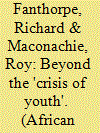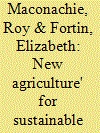|
|
|
Sort Order |
|
|
|
Items / Page
|
|
|
|
|
|
|
| Srl | Item |
| 1 |
ID:
094926


|
|
|
|
|
| Publication |
2010.
|
| Summary/Abstract |
Sierra Leone's conflict has often been characterized as a 'crisis of youth'. For some, the post-war resurgence of grassroots associational life represents the unleashing of long-suppressed youth egalitarianism, yet this analysis tends to ignore the role of international aid in providing an economic incentive for impoverished Sierra Leoneans to embrace formal association. Case study evidence also shows that politics of 'community' identification and moral economies of patronage continue to affect post-war aid. Evidence of post-war social change can nevertheless be found outside the development sector. Diamond mining has long served as a driver of cultural modernization in Sierra Leone and detailed examination of post-war associational life in Kono District reveals that new foci and techniques of social activism have emerged since the end of the civil war. The decline of artisanal mining, with the expansion of large-scale industrial mining, and renewed interest in farming are driving a parallel resurgence of associational life in rural areas. Given that most Sierra Leoneans continue to depend on farming, this rural resurgence could yet represent the most durable basis for democratic change in Sierra Leone.
|
|
|
|
|
|
|
|
|
|
|
|
|
|
|
|
| 2 |
ID:
084753


|
|
|
|
|
| Publication |
2008.
|
| Summary/Abstract |
Sierra Leone has recently emerged from a long period of political instability and civil war, and is ranked among the world's poorest countries. Thousands of displaced people are in the process of returning to their villages to rebuild their mainly farming-based livelihoods, and many are growing food crops for the first time in a decade. With pressure on food production increasing in rural areas, the inland valley swamps have been identified by the government as a vital resource for sustaining rural livelihoods and achieving food security through the production of rice and other commodities. However, previous government policies directed at enhanced wetland production have largely failed to achieve their goals, and have been criticised for neglecting the institutional challenges of development. Drawing on recent fieldwork carried out in two rural communities in the Eastern Province, this paper considers how institutional arrangements function in Sierra Leone's swamp wetlands, and explores how stresses associated with a post-conflict environment are shaping land-use decisions and mediating access to resources in new ways. The findings of the enquiry have implications for Sierra Leone's recently adopted commitment to decentralisation, a move that has, in theory, seen the state strengthen its position at the local level, and will allegedly create new spaces for increased interaction between state agencies, traditional leaders and communities. Two institutional challenges are examined - access to land and access to labour - that must be addressed if decentralised reforms to resource management are to be effective for wetland rice production. The analysis concludes by considering one recent initiative at the forefront of efforts to decentralise the Ministry of Agriculture, the 'Agricultural Business Unit' (ABU) initiative, to elucidate some of the challenges faced in post-conflict wetland rehabilitation.
Correspondence:
|
|
|
|
|
|
|
|
|
|
|
|
|
|
|
|
| 3 |
ID:
120921


|
|
|
|
|
| Publication |
2013.
|
| Summary/Abstract |
In sub-Saharan Africa, commercial bioenergy production has been hailed as a new form of 'green capitalism' that will deliver 'win-win' outcomes and 'pro poor' development. Yet in an era of global economic recession and soaring food prices, biofuel 'sustainability' has been at the centre of controversy. This paper focuses on the case of post-war Sierra Leone, a country that has over the last decade been consistently ranked as one of the poorest in the world, facing food insecurity, high unemployment and entrenched poverty. Following a recent government strategy to secure foreign direct investment in biofuels production in agriculturally rich regions of the country, the largest foreign investment in Sierra Leone since the end of its civil war has been secured: a Swiss company is to invest US$368 million into a large-scale biofuels project over the course of 3 years, and promises to simultaneously stimulate an enabling environment for investment, provide job opportunities for youth and increase food production. For multiple actors involved in the project, the concept of 'sustainability' is crucial but accordingly there are varying interpretations of its meaning. Such differences in interpretation and the complex contradictions within discourses of sustainability are in turn framed by the various scales within which these actors are situated. While attempts have been made to manage these contradictions through global sustainability standards, the unequal power relations between different actors will ultimately determine the ways in which they are likely to be resolved. The paper concludes by reflecting on how these processes may be contributing to a changing governance landscape and wider global political economy within which bioenergy is being produced, processed and consumed.
|
|
|
|
|
|
|
|
|
|
|
|
|
|
|
|
|
|
|
|
|